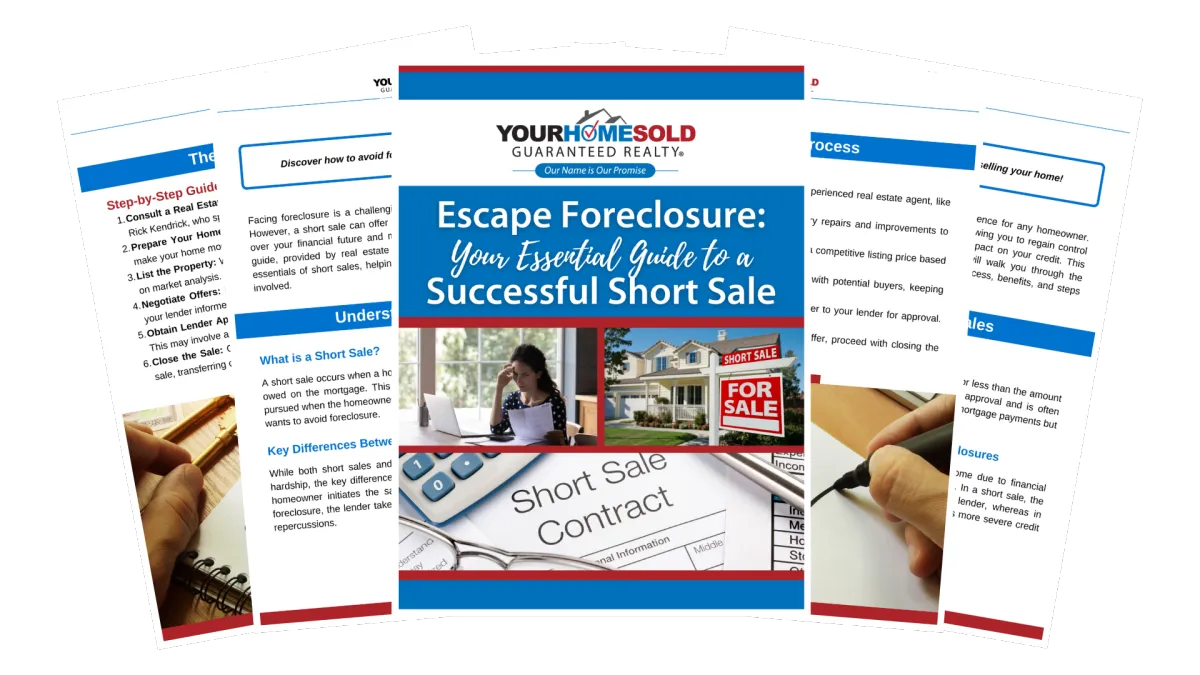Escape Foreclosure: Your Essential Guide to Successful Short Sales

Common Myths About Short Sales
Navigating the realm of real estate can be a complex endeavor, particularly when it involves short sales. Whether one is confronting financial difficulties or merely considering various options, it is essential to have a comprehensive understanding of the intricacies of short sales.
This article aims to elucidate the concept of a short sale, dispel prevalent myths, and provide a thorough guide through the entire process, from preparation to the advantages of collaborating with a specialist.
Readers can expect to acquire valuable insights that will enhance their decision-making within the real estate market of Palm Beach County.
Understanding Short Sales
Understanding short sales is essential for homeowners in Palm Beach County who are experiencing financial distress, particularly for those considering foreclosure as a last resort.
A short sale is defined as the sale of a property for an amount that is less than the outstanding mortgage balance, enabling homeowners to obtain financial relief without enduring the prolonged and often detrimental process of foreclosure.
In the current fluctuating housing market, it is imperative to have a comprehensive understanding of short sales, including the legal implications involved and the resources available to effectively navigate the short sale approval process.
If you are a homeowner or potential seller needing more information about short sales, don't hesitate to schedule a consultation with our experts. Book your appointment here or call/text Rick Kendrick at 561-508-8453.
What is a Short Sale?
A short sale is a real estate transaction in which a homeowner sells their property for an amount less than the outstanding balance on their mortgage, contingent upon the lender's approval. This process enables the homeowner to avoid foreclosure.
Typically, a short sale occurs when the property's value has significantly declined, resulting in financial difficulties for the homeowner. In a traditional sale, the homeowner sells the property for a price that satisfies the mortgage lender's balance; however, in a short sale, the lender must agree to accept a reduced payoff. This situation often requires extensive negotiations among the homeowner, the prospective buyer, and the mortgage lender, which can prolong the timeline and complicate the transaction compared to a standard sale.
It is essential for homeowners to comprehend the potential effects on their credit score and the overall financial implications of a short sale. Additionally, understanding how the sale price may influence their ability to list the property in an attractive and competitive manner within a fluctuating market is of utmost importance.
Common Myths About Short Sales
Despite the increasing awareness surrounding short sales, numerous myths and misconceptions continue to obscure homeowners' understanding, particularly in Palm Beach County.
Such misunderstandings may result in missed opportunities for financial relief and potential investment prospects in distressed properties. It is imperative to distinguish between fact and fiction, especially with regard to homeowner responsibilities, buyer qualifications, and the overall negotiation process associated with short sales.
Facing financial difficulties and considering a short sale? Schedule a consultation with Rick Kendrick to explore your options. Book your session now or reach out directly at 561-508-8453 via call or text.
Debunking Misconceptions
Numerous misconceptions regarding short sales continue to circulate, including the notion that they serve as a quick and straightforward solution for financial difficulties. This misunderstanding can have significant financial repercussions for homeowners if not comprehensively addressed.
In reality, the short sale process is often intricate and typically necessitates extensive negotiations with the lender, who may not be as accommodating as homeowners might anticipate. Many individuals erroneously believe that they can simply list their home and wait for offers; however, it is essential to recognize that lenders must approve the sale price, which can result in prolonged communications and delays.
Another prevalent myth is the belief that a short sale does not impact home equity. In fact, selling a property for less than the amount owed can lead to a loss of equity, thereby affecting the homeowner's future financial prospects. Understanding these complexities is vital for anyone contemplating this option.
The Process of a Short Sale
The short sale process entails several essential steps that homeowners must undertake to obtain short sale approval from their mortgage lender.
This includes the collection of requisite documentation and a thorough understanding of the closing costs associated with the sale.
Understanding the complexities of short sales can be challenging. For personalized guidance and expert advice, schedule a consultation or call/text Rick Kendrick at 561-508-8453.
Steps Involved in a Short Sale
The process involved in a short sale typically commences with obtaining pre-approval from prospective buyers, followed by conducting home inspections and ensuring that appropriate property disclosures are in place.
These initial steps are essential, as they lay the groundwork for a successful transaction. Once pre-approval is attained, it is imperative to carry out comprehensive inspections of the property. Such inspections are instrumental in identifying any potential issues that may impact the sale and in instilling confidence in buyers regarding their investment. Additionally, proper disclosures concerning the property's condition and any outstanding debts are necessary to uphold transparency.
Furthermore, it is crucial for all documentation to adhere to local regulations and requirements, thereby facilitating a smooth short sale process that minimizes risks for all parties involved. The importance of meticulous attention to detail at each stage cannot be overstated, as it significantly influences the overall success of the sale.
Benefits of a Short Sale
Choosing to pursue a short sale can offer homeowners considerable advantages, including financial relief from substantial debt and the opportunity to mitigate the adverse consequences associated with foreclosure.
Additionally, this approach allows homeowners to explore alternatives to foreclosure through various available housing assistance programs.
If you need more details or wish to discuss your situation with a specialist, schedule a consultation with us. Book an appointment or contact Rick Kendrick at 561-508-8453 via call or text for immediate assistance.
Why Consider a Short Sale?
Considering a short sale may be the most viable option for homeowners experiencing financial distress, as it provides a pathway to financial relief and presents potential opportunities within the real estate market.
By opting for a short sale, homeowners can mitigate some of their mortgage burdens while relieving themselves from the anxiety associated with an impending foreclosure.
A thorough understanding of current market trends is essential in this decision-making process, as it enables sellers to assess property values and make informed choices.
Numerous community resources are available, including housing counselors and local real estate agents who specialize in helping individuals through this challenging phase.
These professionals can effectively guide homeowners in navigating the complexities of a short sale, facilitating a return to stability and advancing toward a more favorable financial situation.
How to Prepare for a Short Sale
Preparing for a short sale is crucial for homeowners aiming to achieve a successful outcome. This process entails strategic planning, a comprehensive understanding of local market trends, and the development of effective negotiation strategies with potential buyers.
Tips for a Successful Short Sale
To achieve a successful short sale, homeowners should concentrate on several key strategies, including an understanding of whether they are operating in a buyer's market or a seller's market, as well as the implementation of effective negotiation tactics throughout the process.
By recognizing current market conditions, homeowners can assess the level of interest in their property and adjust their pricing strategy accordingly. Furthermore, employing negotiation tactics can profoundly influence the transaction's outcome; for instance, demonstrating a willingness to accommodate buyer concessions can facilitate a more constructive dialogue.
It is also essential for homeowners to seek professional guidance from real estate agents who specialize in short sales, as their expertise can assist sellers in navigating complex paperwork and negotiations with lenders. This comprehensive approach not only increases the likelihood of a smooth transaction but also enhances the overall success of the short sale process.
Working with a Short Sale Specialist
Collaborating with a short sale specialist can provide substantial advantages for homeowners by utilizing the agent's expertise, realtor insights, and thorough market analysis. This partnership helps to streamline the short sale process and optimize potential outcomes.
If you need more details or wish to discuss your situation with a specialist, schedule a consultation with us. Book an appointment or contact Rick Kendrick at 561-508-8453 via call or text for immediate assistance.
Why It's Important to Work with an Expert
The significance of collaborating with an expert in short sales cannot be overstated, as their comprehensive knowledge of documentation requirements, negotiation strategies, and financial implications can greatly influence the success of the transaction.
These professionals possess an in-depth understanding of the complexities involved, from the preparation of accurate paperwork to the navigation of lender requirements. Their expertise not only streamlines the process but also mitigates potential risks that could hinder a sale.
By leveraging their familiarity with various financial nuances, they assist homeowners in avoiding pitfalls that may lead to costly errors or delays. A skilled short sale agent can negotiate effectively on behalf of their clients, striving to achieve the most favorable terms and conditions, thereby enhancing the overall financial outcome.
With their guidance, individuals facing financial challenges can confidently navigate the path to recovery.
Frequently Asked Questions
What is a short sale?
A short sale is a real estate transaction in which the homeowner sells their property for less than the amount owed on their mortgage.
Do I have to be in financial distress to qualify for a short sale?
No, although financial distress is a common reason for a short sale, it is not the only qualifying factor. Other factors such as job loss, divorce, or relocation may also qualify you for a short sale.
Will I still be responsible for the remaining balance on my mortgage after a short sale?
In most cases, no. A short sale is often negotiated with the lender to forgive the remaining balance on the mortgage. However, it is important to consult with a financial advisor or attorney to fully understand your rights and responsibilities in a short sale.
Will a short sale negatively affect my credit score?
While a short sale will have some impact on your credit score, it is typically less damaging than a foreclosure. It is important to note that every situation is different and it is best to consult with a credit specialist to fully understand the potential effects on your credit score.
Can I continue living in my home during the short sale process?
Yes, you can continue living in your home until the short sale is finalized. However, it is important to actively participate in the process and keep your home in good condition for potential buyers.
Do I need to use a real estate agent for a short sale?
While it is not required, it is highly recommended to use a real estate agent with experience in short sales. They can guide you through the process and negotiate with the lender on your behalf for the best possible outcome.
We’ve Created A Beginner-Friendly Guide To Help Your on Your Path to Financial Recovery
Unlock the secrets to navigating financial distress with "Escape Foreclosure: Your Essential Guide to Successful Short Sales." This comprehensive guide empowers homeowners with the knowledge and strategies needed to navigate the complexities of short sales effectively. Whether you're seeking to minimize credit impact, regain control over your financial future, or explore options for debt forgiveness, this guide provides step-by-step instructions and expert insights to help you successfully navigate the short sale process. Don't let foreclosure define your financial future—take charge with the essential tools and guidance offered in this indispensable resource.

2022 All Rights Reserved.



